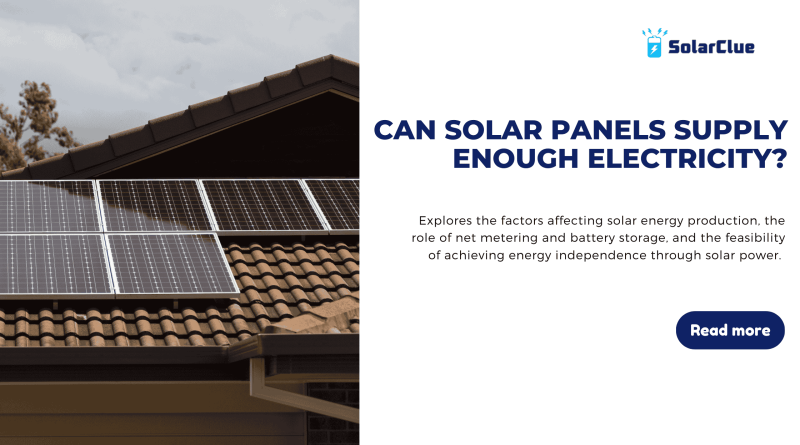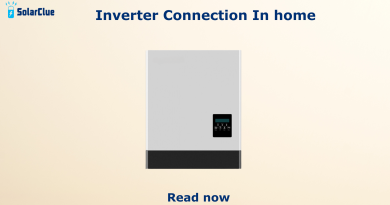Can Solar Panels Supply Enough Electricity?
As solar technology advances, more homeowners and businesses are considering whether solar panels can supply enough electricity to meet their energy needs. This blog post explores the factors affecting solar energy production, the role of net metering and battery storage, and the feasibility of achieving energy independence through solar power. We’ll also examine case studies and the impact of government policies on solar adoption.
Table of Contents
- 1 Factors Affecting Solar Energy Production
- 1.1 The Role of Net Metering and Grid Connection
- 1.2 The Importance of Battery Storage
- 1.3 Solar Panel System Sizing for Different Energy Needs
- 1.4 Achieving Energy Independence Through Solar Power
- 1.5 Overcoming Challenges and Limitations
- 1.6 The Future of Solar Power and Its Potential to Meet Energy Demands
- 1.7 Case Studies of Homes and Businesses Powered by Solar Energy
- 1.8 The Impact of Government Policies and Incentives on Solar Adoption
- 1.9 Conclusion
- 1.10 FAQs
Factors Affecting Solar Energy Production
The amount of electricity a solar panel system can generate depends on several factors:
- Panel Size and Efficiency: Larger and more efficient solar panels can generate more electricity. The wattage rating of each panel determines how much energy it can produce under optimal conditions.
- Location: The geographic location of your home or business affects the amount of sunlight available. Areas closer to the equator or with less cloud cover generally receive more sunlight.
- Sunlight Exposure: The orientation and tilt of the panels, as well as shading from trees, buildings, or other obstacles, can impact energy production. South-facing roofs with an optimal tilt angle are ideal in the northern hemisphere.
- Weather Conditions: Solar panels produce less electricity on cloudy days or during winter months when sunlight is weaker. However, they can still generate power in indirect sunlight.
The Role of Net Metering and Grid Connection
Net metering is a crucial component for homes and businesses that rely on solar power:
- How Net Metering Works: When your solar panels produce more electricity than you need, the excess is sent to the grid, and you receive credits on your utility bill. During times when your panels produce less electricity (e.g., at night), you can use these credits to draw power from the grid without incurring additional costs.
- Grid Connection: Remaining connected to the grid provides a safety net, ensuring that you have access to electricity even when solar production is low. This setup is known as a grid-tied solar system.
The Importance of Battery Storage
Battery storage enhances the reliability and flexibility of solar power systems:
- Storing Excess Energy: Batteries store excess energy produced during the day for use at night or during periods of low sunlight. This reduces dependence on the grid and increases energy independence.
- Backup Power: In the event of a power outage, battery storage can provide backup power to critical appliances and systems, ensuring continuity of operations for businesses and comfort for homes.
- Load Shifting: Batteries can be used to store energy during off-peak hours when electricity rates are lower, and then use it during peak hours to reduce electricity costs.
Solar Panel System Sizing for Different Energy Needs
The size of the solar panel system required to power a home or business depends on energy consumption:
- Home Energy Needs: Calculate your home’s average daily energy consumption (kWh/day) and compare it to the expected energy production of your solar panel system. For most homes, a 5-10 kW system can cover the majority of energy needs.
- Business Energy Needs: Businesses with higher energy demands may require larger solar systems, potentially in the range of 20-50 kW or more. Factors such as operational hours, equipment usage, and building size play a significant role in determining system size.
Estimated Solar System Sizes for Different Energy Needs
| Type | Average Energy Use (kWh/day) | Recommended System Size (kW) |
|---|---|---|
| Small Home | 10-15 | 3-5 |
| Medium Home | 20-30 | 5-10 |
| Large Home | 40-60 | 10-15 |
| Small Business | 50-100 | 10-20 |
| Medium Business | 150-300 | 30-50 |
| Large Business | 500+ | 50+ |
Achieving Energy Independence Through Solar Power
Energy independence refers to the ability to meet all of your energy needs without relying on external sources like the grid:
- Off-Grid Systems: Homes or businesses in remote areas may opt for off-grid solar systems, relying entirely on solar panels and battery storage. This requires careful planning to ensure sufficient energy production and storage capacity.
- Hybrid Systems: A hybrid system combines solar panels, battery storage, and grid connection. This setup offers the benefits of energy independence while retaining the security of grid access when needed.
- Energy Efficiency: Reducing energy consumption through efficiency measures, such as LED lighting, energy-efficient appliances, and smart energy management systems, can make it easier to achieve energy independence with a smaller solar system.
Overcoming Challenges and Limitations
While solar power is a powerful solution, there are challenges to consider:
- Initial Costs: The upfront cost of solar panels, inverters, and battery storage can be high, though government incentives and financing options can help reduce this burden.
- Space Requirements: Sufficient roof or land space is needed to install enough solar panels to meet your energy needs. Businesses with large energy demands may require significant space for their solar installations.
- Intermittency: Solar power is dependent on sunlight, making energy production variable. This can be mitigated with battery storage and grid connection.
The Future of Solar Power and Its Potential to Meet Energy Demands
As technology advances, the potential for solar power to meet energy demands continues to grow:
- Improved Efficiency: Solar panel efficiency is steadily increasing, allowing for more energy production from smaller or fewer panels.
- Cost Reductions: The cost of solar technology, including panels and batteries, is decreasing, making solar power more accessible to a broader range of users.
- Integration with Smart Grids: Future solar power systems will likely be integrated with smart grids, enabling more efficient energy distribution and management, reducing reliance on fossil fuels, and enhancing grid stability.
Case Studies of Homes and Businesses Powered by Solar Energy
Examining real-world examples can provide insights into the effectiveness of solar power:
- Residential Case Study: A family home in California uses a 7 kW solar system with battery storage, achieving near-complete energy independence and significantly reducing energy bills.
- Commercial Case Study: A small business in Texas installed a 50 kW solar system, using net metering to offset energy costs and battery storage for backup power. The business has reduced its reliance on the grid by 80%.
The Impact of Government Policies and Incentives on Solar Adoption
Government policies and incentives play a crucial role in promoting solar adoption:
- Tax Credits: Federal and state tax credits can reduce the initial cost of solar installations by up to 30% or more, making solar power more affordable.
- Rebates and Grants: Various programs offer rebates and grants for solar installations, further reducing costs and encouraging adoption.
- Net Metering Policies: Favorable net metering policies allow homeowners and businesses to receive full credit for excess electricity sent to the grid, making solar power more economically viable.
Conclusion
Solar panels can indeed supply enough electricity to power a home or business, but achieving this depends on factors like system size, location, and energy consumption. Net metering, battery storage, and energy efficiency practices play crucial roles in maximizing the benefits of solar power. With continued advancements in technology and supportive government policies, solar power has the potential to meet a significant portion of our energy demands, paving the way for a sustainable energy future.
Here at SolarClue®, we offer a smart, practical, and “beautiful” solution. You will be answered for all the questions related to Solar.
We provide all kinds of brands that are the Best Solar panels in India.
If you are the one who is planning for the solar power system. Don’t hesitate to contact our team!
Looking forward to empowering you with solar energy, just like hundreds of our other clients!
FAQs
Q1: Can solar panels provide enough power for my entire home or business?
A: Yes, with the right system size and proper planning, solar panels can supply enough electricity to power your home or business. However, factors like location, energy consumption, and available roof space must be considered.
Q2: What happens if my solar panels don’t produce enough energy?
A: If your solar panels don’t produce enough energy, you can draw electricity from the grid (if connected) or use stored energy from a battery system. Net metering allows you to offset this cost by earning credits for excess energy produced during peak sunlight hours.
Q3: Is it possible to achieve energy independence with solar power?
A: Yes, it’s possible to achieve energy independence with solar power, especially when combined with battery storage and energy-efficient practices. Off-grid systems can completely eliminate reliance on the grid, while hybrid systems offer a balance between independence and grid security.
Q4: How do government incentives affect the cost of solar installations?
A: Government incentives, such as tax credits, rebates, and grants, can significantly reduce the upfront cost of solar installations, making them more affordable and improving the return on investment.
Q5: Are there any limitations to solar power?
A: While solar power is a reliable and sustainable energy source, it’s dependent on sunlight, making it intermittent. Battery storage and grid connection can help overcome these limitations by providing energy when solar production is low.


